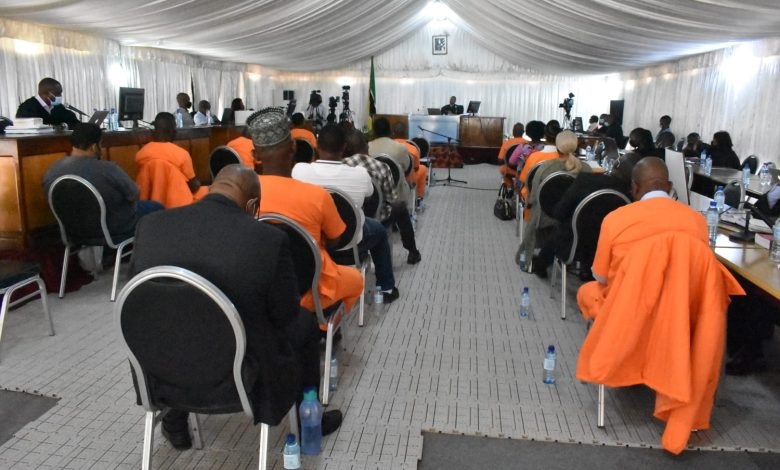Mozambique: EUMAM MOZ visits Role 1 Medical Facility at Katembe
Hidden debts: Two witnesses fail to appear in court – AIM report

Image: Domingo
The Maputo City Court on Tuesday should have heard a further two witnesses in the case of Mozambique’s “hidden debts” – but neither of them appeared in the courtroom.
One, Hafiz Taqir Wahaj, is the owner of the Africambios foreign exchange bureau in central Maputo, which the prosecution believes is deeply involved in the money laundering schemes designed by the Abu Dhabi based group, Privinvest.
Attempts to serve a summons on Taqir, ordering him to appear before the court, failed. Judge Efigenio Baptista said court officers had repeatedly tried to serve the summons, but Africambios staff said he was out of the country. A man named only as Ismael said Taqir had, two or three months earlier, gone to Dubai to attend his sister’s wedding, and had not yet returned to Mozambique.
Several Africambios workers are defendants in the trial, accused of money laundering, but Taqir has not been charged.
Alice Mabota, lawyer for Khessaujee Pulchand, who had worked as a cashier at Africambios, said it was unjust that cashiers had been arrested, while their employers faced no charges.
Giving evidence in September, Pulchand admitted he had allowed his employers to manipulate an account he had opened at the country’s largest commercial bank, the Millennium-BIM. He said that the owners of Africambios had insisted that he, and other Africambios workers, open bank accounts.
Pulchand explained that his identity documents were used to open the account, which was in his name, but the Africambios management operated the account, and controlled the cheque book. Money from Privinvest passed through this account, as part of a complex web of transactions involving many millions of dollars, euros and meticais. Much of this Privinvest money appears to have been bribes for Gregorio Leao, the former head of the Security and Intelligence Service (SISE) and his wife Angela.
Pulchand told the court he was handling cheques for people and companies he did not know “Because I was told to”.
“So you didn’t know what was happening with your own account”, mused the judge, wondering how Pulchand could ever prove anything about the account.
Opening the account was a condition for keeping his job at Africambios. “I didn’t operate the account”, he insisted. “They told me when I had to sign the cheques”. Pulchand admitted he had no idea of the origin of the funds – he just did as his employers ordered.
“We didn’t know anything”, he claimed. “We just obeyed the orders of the boss”.
Now that boss has gone missing and the Bank of Mozambique, alerted to illegal foreign currency dealings at Africambios, has closed it down.
Mabota demanded that an international arrest warrant be issued, in order to bring Wahaj back to Maputo. She also wanted all the assets of Africambios seized.
But Baptista pointed out it would be impossible to serve such an arrest warrant when no official of the court had been able to speak to Wahaj, and nobody knew where he was. As for seizing Africambios assets, it would first be necessary to verify whether they had been used for criminal purposes.
The second witness who failed to show up was lawyer Alexandre Chivale. He had begun the trial as the lawyer for some of the most high-profile defendants, including Ndambi Guebuza, the oldest son of former President Armando Guebuza, and Antonio Carlos do Rosario, the head of economic intelligence at SISE.
But on 19 October, Baptista ordered Chivale to leave the case, on the grounds of serious conflicts of interest. He was responding, rather belatedly, to a request made on the first day of the trial, 23 August, when prosecuting attorney Sheila Marrengula asked the judge to take action against Chivale because he is a director of Txovela Investments, a company effectively run by Rosario which has close links to Privinvest.
Marrengula argued that Txopela is one of the channels for distributing bribes from Privinvest. After Rosario’s arrest, properties registered in his name were seized, including three central Maputo flats, two offices and a shop – but, much to the prosecution’s annoyance, they were handed over to Txopela Investments, as the “bona fide depositary”, despite Txopela’s close relations with Rosario.
To run Rosario’s property portfolio, Chivale set up another company, Dandula Investments, in which he owns 75 per cent of the shares. He also took advantage of the situation to occupy one of the flats (though he claims to own several other houses).
In October, Baptista agreed with the prosecution that it was intolerable to allow Txopela and Dandula to continue running the properties. Txopela, he pointed out, “is accused of money laundering, and that money was used to buy property, including the flat where Alexandre Chivale is now living”.
Chivale had to surrender the flat, and the keys to all Txopela properties. Baptista also threw Chivale off the case altogether because of his conflicts of interest. So Rosario and Ndambi Guebuza had to find another lawyer to represent them.
Now Chivale is wanted back in court – but as a witness, not a lawyer, to testify to the activities of Txopela investments, in which he was a director. A court officer tried to serve a summons on Chivale, without success.
Unlike the case of Wahaj, the officer managed to speak to Chivale, who claimed to be on holiday He did not say where he was, or when he was returning. He did not give the court his current address either – since he left the Txopela flat, the court has not had a home address for him.
Baptista had no doubt that Chivale was deliberately avoiding the court officer, so that he would not receive the summons. He was “completely disrespectful of the court”, although “he knows that he is committing a crime”.
On Monday night, Baptista warned that, if Chivale did not appear in court on Tuesday, he would order his arrest.
The judge was as good as his word. He announced that he was fining Chivale 50,000 meticais (781 US dollars, at the current exchange rate), and was issuing an arrest warrant so that he will appear in court a prisoner. He will also face legal proceedings for the crime of disobedience.













Leave a Reply
Be the First to Comment!
You must be logged in to post a comment.
You must be logged in to post a comment.